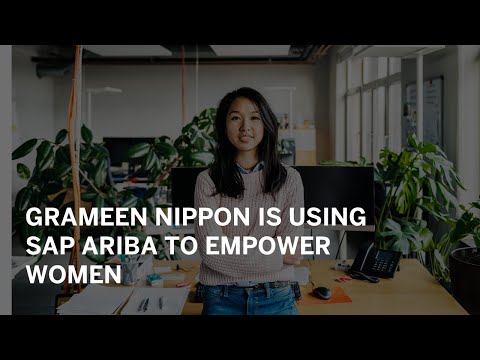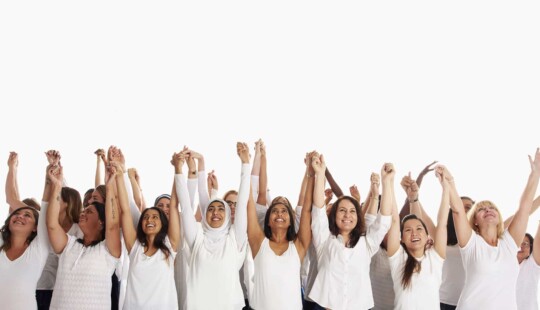As a single mother in Japan, Saya was worried about paying her bills and making ends meet. Although she had a background as a beautician and reflexologist, she did not feel confident enough to start her own business. She knew she could make her customers relax and feel good about themselves, but she was not good at business planning and managing finances. While attending a counseling session at Japan’s Single Mother Support Association, she learned about a microfinancing program by Grameen Nippon that supports entrepreneurship and helps women like herself take the plunge into independence.
“If you think you can’t do something, you can’t,” says Saya. “But once you have financial support and a network of people with similar experiences, you realize that you can become your own greatest asset.”

Ending Poverty
Being a single mother is never easy. Financial disadvantages and having sole responsibility for the household and the children are just a few of the challenges facing women on their own with their kids. In traditional societies, such as Japan, that expect women to stay at home to raise children while their husbands work, there may even be cultural attitudes that place a stigma on single mothers, making it even harder.
Japan still remains a wealthy, developed nation. But its population is aging and poverty is festering, particularly among the young. Economic disparities are gradually increasing and, since the pandemic, single mothers and women in non-regular work have been particularly hard hit. Domestic violence and the number of female suicides remain high. In 2018, Japan’s poverty rate was almost 16%, which includes people whose household income is less than half of the median of the entire population. Equally worrisome is the fact that the poverty of the parents’ generation leads to educational disparities and, consequently, poverty for their children.
Although the majority of the world’s poor live in underdeveloped and developing countries, a fair number also live in the developed world – some in the wealthiest countries on earth. As human beings, our well-being is linked to each other. Growing inequality is detrimental to economic growth and undermines social cohesion, increasing political and social tensions and driving instability and conflicts. For this reason, the United Nations declared the objective of ending ‘extreme poverty’ to be the No. 1 goal of the global Sustainable Development Goals (SDGs).
Empowering Women
Besides eradicating poverty, Grameen’s programs are also helping to achieve other SDGs, including empowering and educating women and girls, reducing inequality, and providing decent work and economic growth.
Grameen Nippon was established in 2018 as the Japanese version of Grameen Bank, a microfinance institution established in Bangladesh by Dr. Muhammad Yunus, whose work was awarded the Nobel Peace Prize in 2006. Grameen Nippon leverages Grameen Bank’s expertise to provide microfinance, mainly to single mothers and women in informal labor who are in need, and to create employment and new business opportunities in partnership with various companies and organizations. The main goal is to encourage people to take the first step.
The program provides low-interest, unsecured, small loans, not for living expenses, but for starting a business. Members form mutual support groups of five, trusting and encouraging each other to nurture their desire for self-support and to step up their efforts to find employment or freelance work. In partnership with a variety of companies and organizations, the program provides skills and know-how for entrepreneurship and employment as well as accompanies members in their efforts to become self-reliant.
“Most single mothers and women working part-time have few places to gain or utilize their skills,” says Masahiro Momono, president, Grameen Nippon. “These women seldom have a solid credit history, making it difficult for them to acquire loans. We help them acquire skills, experience, and an opportunity to borrow money and pay it back little by little, opening doors to other banks.”
Not all single mothers are the same. Grameen’s approach is persona based. Urban single moms in Tokyo, for example, are usually in the 30-to-50 age bracket. Many are divorced, have been out of work while raising children, and are not receiving child support. Suburban or rural single moms are much younger, lacking education and experience. “Their needs are very different,” says Momono-San, explaining that there are different setups for B2B and B2C opportunities.
In order to manage fragmented information and the need for differentiated services, Grameen decided to pilot SAP’s social recruitment platform, a customizable job matching digital platform developed by a team from SAP Fieldglass, a cloud-based, open vendor management system that helps organizations find, engage, manage, pay, and unlock more value from a growing external workforce.
Improving Lives
The idea originated when ISBN Japan Regional Vice President Satoru Ota had the idea of digitalizing a job matching process that would help unemployed people suffering from poverty find quality positions. As part of SAP’s flagship social intrapreneurship program, SAP One Billion Lives, the SAP Fieldglass team is leveraging its collective industry knowledge to create an ecosystem where candidates can feel confident that companies using the social recruitment platform treat their employees well while matching individuals with positions that best suit them.
With the success of the Grameen pilot and as the platform gains more users, the team believes the social recruitment tool from SAP will evolve to help others, such as artists, independent contractors, and those whose industries may offer poorer visibility into open positions.
For Momono-San and the team at Grameen, the platform is a tool that supports the bank’s goals to drive sustainable development by building skills, enabling employment, and helping women gain confidence on their path to financial independence.



